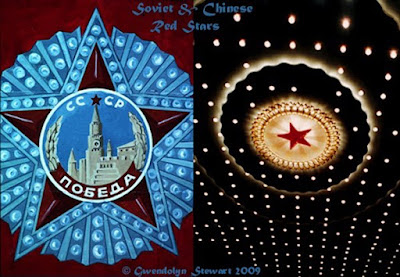RED STARS
GORBACHEV & DENG XIAOPING
Twenty years ago today the Communist giants met, in Beijing, for the first time in three decades. Mikhail Gorbachev, the General Secretary of the Communist Party of the Soviet Union, made the trip to China for talks with Deng Xiaoping, the paramount leader, and Zhao Ziyang, the General Secretary of the Chinese Communist Party.
The leaders met in the Great Hall of the People. In the ceiling of its vast auditorium is the red star of communism (above, right). The Soviets were the seniors in revolution, the Bolsheviks having taken power in Russia in 1917; the People's Republic of China was not founded until 1949. As can been seen in the sample of a Soviet red star (left), the USSR placed special additional emphasis on its contribution to the victory over the Fascists/Nazis.
Gorbachev was himself a star when he came to Beijing -- to the outside world, certainly, for the reforms he had undertaken back in the USSR -- perestroika and glasnost'. He also had admirers among the Chinese, including some of those demonstrating in Tiananmen Square, the heart of Beijing, when he arrived.
The story of the Sino-Soviet rapprochement brought the international media, and the Tiananmen demonstrations provided a dramatic story just waiting to be broadcast. The dénouement was the crackdown of June 3-4, 1989.
Zhao Ziyang lost his post, and lived out his life under house arrest. His memoirs are just now being published.
Mikhail Gorbachev went back to Moscow to continue his attempts to reform the USSR. The USSR dissolved into its constituent parts ("Republics") at the end of 1991.
Jiang Zemin was brought from Shanghai to be the new General Secretary, and Deng Xiaoping remained the power behind the throne unto death. The People's Republic of China is due to celebrate its sixtieth anniversary on October 1, 2009.
Arguments raged about which path to reform was superior, the Soviet or the Chinese. Which was the brighter "Red Star," Gorbachev or Deng?
The story of the Sino-Soviet rapprochement brought the international media, and the Tiananmen demonstrations provided a dramatic story just waiting to be broadcast. The dénouement was the crackdown of June 3-4, 1989.
Zhao Ziyang lost his post, and lived out his life under house arrest. His memoirs are just now being published.
Mikhail Gorbachev went back to Moscow to continue his attempts to reform the USSR. The USSR dissolved into its constituent parts ("Republics") at the end of 1991.
Jiang Zemin was brought from Shanghai to be the new General Secretary, and Deng Xiaoping remained the power behind the throne unto death. The People's Republic of China is due to celebrate its sixtieth anniversary on October 1, 2009.
Arguments raged about which path to reform was superior, the Soviet or the Chinese. Which was the brighter "Red Star," Gorbachev or Deng?

No comments:
Post a Comment